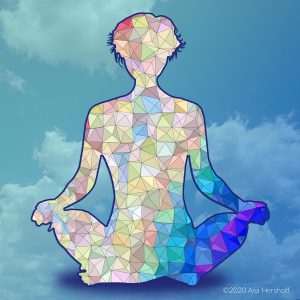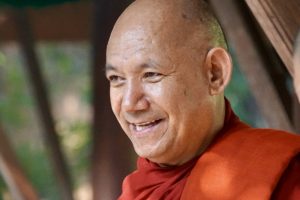
The Korean Seon (Zen) master Venerable Pomnyun Sunim (법륜스님) wears many hats: Buddhist monk, teacher, author, environmentalist, and social activist, to name a few. As a widely respected Dharma teacher and a tireless socially engaged activist in his native South Korea, Ven. Pomnyun Sunim has founded numerous Dharma-based organizations, initiatives, and projects that are active across the world. Among them, Jungto Society, a volunteer-based community founded on the Buddhist teachings and expressing equality, simple living, and sustainability, is dedicated to addressing modern social issues that lead to suffering, including environmental degradation, poverty, and conflict.
This column, shared by Jungto Society, presents a series of highlights from Ven. Pomnyun Sunim’s writings, teachings, public talks, and regular live-streamed Dharma Q+A sessions, which are accessible across the globe.
The following teaching was given in London on 6 September. This article is the sixth in a series taken from Ven. Pomnyun Sunim’s Dharma tour of Europe and North America—his first overseas tour since the pandemic—titled “Casual Conversation with Ven. Pomnyun Sunim: Come Talk about Life, Wisdom, and Happiness” from 1–22 September 2023, taking in 21 cities: six in Europe and 15 in North America.*

I feel overly dependent on my husband
Q: I married not too long ago. It’s the first marriage for both of us. I’m Korean and my husband is British, and I find myself relying on him a lot. I’ve been in London for three years now and while I’m changing jobs quite a bit, my husband went on a business trip to Saudi Arabia a week ago. Once we were apart for two months and it made me feel incredibly lonely. During that time, I realized that I was becoming overly dependent on my husband. Suddenly, I became afraid of the future.
I grew up as an only child and my father passed away a year ago, leaving only my mother in Korea. If my mother were to pass away too, I would be left with only my husband. So I started having thoughts like, “What if something happens to my husband, and he passes away before me? What will I do?” I found myself worrying about the death of someone who is perfectly healthy right now, which made me realize that I better sort this out before it gets worse. With this tendency I have to rely on others, what kind of practice should I do?
Ven. Pomnyun Sunim: The most important thing is that you must be without fear, whether or not you rely on your husband.
First, there’s no problem in relying on others. If you’ve been relying on your parents and they pass away, you can rely on your husband. If you’ve been relying on your husband and he passes away, you can rely on another man.
Q: But I made a promise with my husband. I told him that after he passes away, I will become a monk.
Ven. Pomnyun Sunim: Well, you don’t have to keep that promise after he’s gone! (Audience laughter)
Q: Because of that promise, I pray while reciting the Diamond Sutra every day.
Ven. Pomnyun Sunim: Just because you make vows while praying, it doesn’t mean everything will be fulfilled. Just as when you married, you began to rely on your husband, when you become a monk you will rely on the Buddha. So you don’t have to worry until after your husband passes away. Needing someone to rely on means that you rely on this person, and when this person is gone you will rely on another person.
If, after her husband dies, the wife cries sadly and says, “How am I supposed to go on without you here,” it often indicates a higher likelihood that another man will come into her life soon. That’s because such individuals have a strong reliance on others and need to find something or someone on whom to rely. Although they initially complain about how difficult it is to live in a world without their husband, they soon find solace in relying on another man. At first, it may seem a bit bewildering, but they eventually turn to another man for support.
For example, let’s say you were walking with a cane due to a leg injury, but then you lost your cane. Would you just limp around without any support? No, you need something to lean on. So when you lean on something, you shouldn’t think of it as something negative. There’s no problem with someone with a hurt leg using a cane.
Secondly, if you continue to use a cane until you die, people might mock you and say that you have a disability. If you want to avoid being seen in that way, then you need to let go of the cane. To become a free, unhindered person, you must let go of the cane. You need to become someone who doesn’t rely on others so that you can be the master of your own life.
Q: Could I really be like that?
Ven. Pomnyun Sunim: To become a person who does not depend on others, you must not think about benefiting from others. In all matters, you shouldn’t think about what benefit you’ll get from them., whether financial or emotional. Instead of hoping that the other person understands you, you should be the one to understand them. Rather than expecting the other person to love you, you should be the one to love them. Instead of waiting for the other person to help you, you should be the one to help them.
Q: Yes, it’s true. I’ve lived my life always wanting understanding from others. Just like you said, Sunim, the “please love me” illness.
Ven. Pomnyun Sunim: When we make a distinction between the Buddha and sentient beings, “Buddha” refers to the giver, and “sentient beings” refers to the receivers. Sentient beings ask the Buddha for everything, while the Buddha wants to give everything to sentient beings. The giver can be seen as the master and the receiver can be seen as the servant. The same applies in Christianity. If all you do is ask God for everything, then you can be considered a servant. God is the giver, so you can call Him the master.
You must live a life in which you are the master of your own life. To achieve this, you need to let go of the desire to rely on someone or something. If you claim to renounce the world but still cling to reliance, it’s not true renunciation; it’s simply running away. True renunciation, as originally intended by the Buddha, means letting go of reliance. It means not relying on anyone. When someone renounces the world but still holds onto their reliance by now relying on the Buddha, all that’s happened is a change in the object of their reliance, like taking the Buddha as another husband.
Therefore, you must let go of reliance. I don’t ever ask any of you to give me something. But that doesn’t mean you have to always give even when you’re in a situation where you can’t. If you can give, then give, but when you can’t, at least don’t beg. Whether it’s money, emotions, understanding, or love, you should not beg from others. This is the path to living as your own master.
You should also not think that begging is inherently bad. There’s no need to think that not begging is the right path and that begging is something bad. If you don’t beg, you are the master of your own life, but it’s okay even if you do beg.
Usually when people beg they go from one person to another if that first person doesn’t give them what they want. They continue like this, begging from person to person. You can live like this. However, the issue in your case is that you want to beg while also wanting to be the master. That’s the contradiction. If you want to beg, you have to live as a beggar, and if you don’t like that, then you need to live as the master of your own life.
Indeed, most people go through life begging. If you need money to live, you can earn it yourself. Yet, people pray to God: “Please let me earn a lot of money.” You can choose on your own with whom to spend the rest of your life. Still, people pray to the Buddha: “Please help me meet a good person.” To pass an exam, you can study hard. But people pray to the Buddha: “Please let me pass the exam.” Who typically prays for help when it comes to studying—an excellent student or a struggling one?
Q: The student who is struggling prays.
Ven. Pomnyun Sunim: When a struggling student prays and the Buddha grants their wish, it means that the Buddha has helped one struggling student pass while leaving out an excellent student. In other words, the Buddha becomes a broker for entrance exams. For your wish to come true, you’ve turned the Buddha into a mere broker. My point is that we engage in such contradictory behavior. It doesn’t mean that religion is bad; it means that this aspect of religion is misguided.
Q: You often talked about abandoning faith-based worship. But I think I still have some faith-based worship inside me.
Ven. Pomnyun Sunim: I don’t say that you should abandon faith-based worship. It seems you have misunderstood me. If you want to have faith-based worship, you can. However, Jungto Society doesn’t practice faith-based worship.
Q: I am a member of Jungto Society, but praying to the Buddha brings comfort to my heart. Is that also not allowed?
Ven. Pomnyun Sunim: No, it is allowed. Jungto Society doesn’t engage in faith-based worship, but individuals within Jungto Society have their own freedom to do what they want. Religious freedom is protected by the constitution. But Jungto Society doesn’t practice faith-based worship. Instead, it teaches Buddhism as a practice and the path to becoming the master of one’s own life. So when I say that Jungto Society doesn’t engage in faith-based worship, it means that we don’t gather together and pray, “Please make this child pass the entrance exam.” But it’s perfectly fine for an individual to pray on their own at a temple, “Please help my child pass the entrance exam.” Because religious freedom is protected by the constitution, we shouldn’t deny someone’s rights based on their different religion or their particular ideology or beliefs. Jungto Society doesn’t discriminate against anyone, whether they are from North Korea, whether they are communist, whether they attend church or go to a temple.
Q: Thank you. I understand what you’re saying.
Ven. Pomnyun Sunim: Just because you come to the UK and live here doesn’t necessarily mean your life will become happier. Can you plant a Korean green bean in the UK and expect it to grow into red beans?
Q: No.
Ven. Pomnyun Sunim: Wherever you go, your karma remains the same. Happiness only comes when you are liberated from karma. Moving to a different place doesn’t automatically bring happiness. It might provide temporary relief, but over time the original issues will resurface. So don’t seek happiness from others. Understand your own karma and attain true freedom from it. That’s when you can truly experience freedom.
When you understand this, you can actually be the ones to show people in the UK a higher level of spirituality and social values. You should learn the positive aspects from the British, but by sharing this understanding with them, you can no longer have a sense of inferiority due to racial or economic aspects:
“You may have more money, but I am happier.”
“You may be better-looking, but I am freer.”
It’s possible for you to live with such confidence.
Living in the UK and constantly complaining about its negative aspects won’t benefit you in any way. In that case, you’d be better off returning to Korea immediately. I hope you can adopt a mindset of understanding others, even when they are different from you, while you embrace and draw on your own strengths.
See more
Pomnyun
Jungto Society
JTS Korea
JTS America
International Network of Engaged Buddhists
Related features from BDG
You Are Alive Today
Everyone Has the Right to be Happy
Personal Action to Mitigate the Climate Crisis
Awareness, the Beginning of Change
How to Live Life More Freely
Related videos from BDG
Dharma Q+A with Ven. Pomnyun Sunim
Wisdom Notes from Ven. Pomnyun Sunim
Related news reports from BDG
Ven. Pomnyun Sunim Joins Religious Leaders in Interfaith Peace Declaration on 70th Anniversary of Armistice on the Korean Peninsula
Pathways to Peace: Ven. Pomnyun Sunim Delivers Talk on Rising Tensions on the Korean Peninsula
Engaged Buddhism: Ven. Pomnyun Sunim Joins JTS Korea Volunteers for Humanitarian Relief Work in Türkiye
Engaged Buddhism: JTS Korea Distributes Humanitarian Aid in Pakistan
Engaged Buddhism: Ven. Pomnyun Sunim and JTS Volunteers Visit Sujata Academy Project in India
Engaged Buddhism: Ven. Pomnyun Sunim and JTS Volunteers Bring 100,000 Gas Stoves to Rohingya Refugees in Bangladesh
Engaged Buddhism: Ven. Pomnyun Sunim Shares the Fruits of Compassion to Mark the Birth of the Buddha
Engaged Buddhism: Ven. Pomnyun Sunim Delivers Compassion to the Vulnerable in Korea
Engaged Buddhism: Jungto Society Delivers Compassion for the Vulnerable in Korea
Engaged Buddhism: JTS Korea Distributes Emergency Flood Relief in Cambodia




















